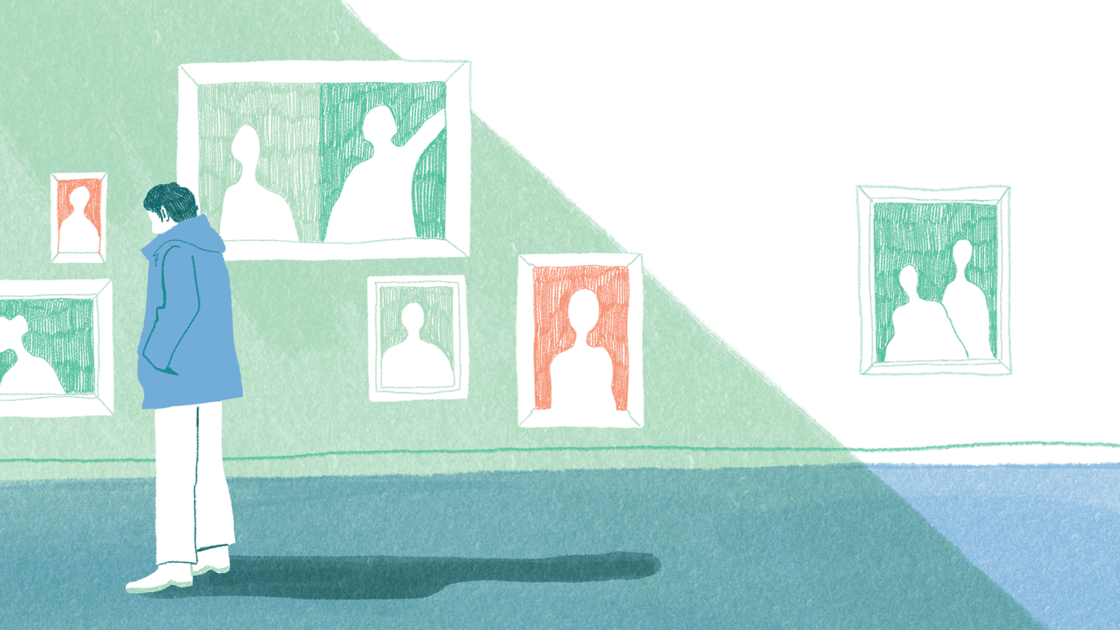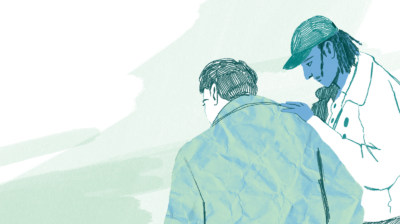How to cope with losing someone to suicide
Suicide bereavement is a devastating experience. It can feel overwhelming, but there are ways of navigating the pain, shock and confusion.

Navigating the grief following a death by suicide doesn’t come with a rule book. Everyone grieves differently and, at times, it can feel overwhelming. It might not always feel possible, but you can adjust to life without the person you lost. It can take a lot of time and it isn’t always easy, but there are things you can do to help you on your grief journey.
Below is a list of things that may help you process and cope with what you’re experiencing. You may not find all of these ideas helpful because what helps one person might not help someone else, but remember that you can choose what supports to use or not use when navigating your grief.
How to cope with losing someone to suicide
Go at your own pace
If you have lost someone to suicide, it can be tempting to set expectations about where you should be in your grief journey at certain times, but that’s not how grief works. There is no right or wrong way to grieve, and grief doesn’t follow a set timeline. How you grief is unique to you.
Suicide bereavement can have a devastating impact, so be patient and kind with yourself as you process it. Take it one day at a time, or even one hour at a time if you need to. The symptoms of grief can be intense, particularly when the loss is recent, so don’t put too much pressure on yourself to do things you don’t feel ready for. Grief doesn’t happen in a set order and setbacks are part of the journey. The pain doesn’t disappear, but it can become less intense and, over time, you can find ways to cope and continue to live your life.
Care for yourself
When a death occurs, grief can make it harder to do practical things that are good for you, like eating well, getting sleep, and exercising. If you’ve lost your appetite, eating smaller meals more often throughout the day can help. Try and take the time you need to rest and get some sleep, and go for light exercise like walks when you can. These are some ways that you can care for yourself while grieving, but you’re the expert of your own needs. You don’t need to feel guilty if you aren’t able to do some of the things you could previously when you’re adjusting to loss.
Acknowledge your feelings
Losing someone to suicide can leave you with a confusing and overwhelming collection of emotions. These emotions can come and go in waves and can often overlap, making it difficult to disentangle them and figure out how you’re feeling. As you move through your grief journey, it’s important to acknowledge how you’re feeling without judging yourself for how you feel. Sometimes, people are shocked by some of the emotions they feel when they’re grieving, or feel ashamed for reacting in certain ways. For example, it’s common to feel some anger towards the person you’ve lost, the other people in your life, or even towards yourself. Even though it’s best not to blame others in these situations, it’s okay to feel this emotion and to express it in a safe, non-aggressive way.
People can also feel some relief following a suicide, especially if the person who died had been unwell and in distress for a long time. This can be a difficult emotion to experience, and you might even feel guilty for feeling relieved. However, feeling some relief doesn’t mean that you aren’t still grieving the person you have lost. Our article on how you regulate your emotions can be helpful if you would like to learn more about how you might manage difficult feelings.
Talk when you’re ready
Losing someone to suicide is a lot to process on your own and many people find that talking to others about what they’re experiencing helps a lot. If you feel you want to talk about what happened and how it’s impacting you, reach out to someone you trust. This could be a friend or family member, or someone in your community. You might prefer to talk to someone who doesn’t know you personally, like a therapist, support group, or helpline. These options can be helpful because when you lose someone to suicide, some of the people around you might not have the capacity to support you in the ways you deserve because they are grieving too. You might find it easier to talk to someone anonymously.
While talking to people can be really helpful, it’s also ok to not want to talk about your loss for a time. If people around you want to talk but that’s not what you need right now, it’s ok to let them know. When someone you know dies by suicide, you might find yourself in situations where people ask you questions about how they died. You may want to tell people when you are ready, but you also don’t have to if you don’t want to. You can tell them that you don’t feel like talking about it at the moment.
Read about suicide and bereavement
Losing someone to suicide can leave you with a lot of unanswered questions. Some people find that learning more about suicide helps them to understand what happened and process their grief. You can learn more about suicide on our website. HUGG also have a lot of helpful and accurate information on suicide and suicide bereavement on their website.
Be mindful of your coping mechanisms
People will turn to many different things to help them manage the intense emotions they experience when they’re grieving. The coping strategies you reach for to deal with grief do not make you a better or worse person, but some coping strategies can be more helpful and effective than others. For example, some people try to manage intense emotions caused by suicide bereavement by isolating themselves, or by using alcohol and drugs. While these reactions are understandable, these coping strategies are often accompanied by problematic side effects. Our article on how to build new coping skills contains information on how to develop new ways of managing the difficult emotions that grief can stir up.
Reach out to family, friends and community
Not everyone will reach out to professional support to help navigate their grief. For many people, the help and support from family and friends, and their wider community is key to coping with suicide bereavement. Trusted people from the wider community can help take the pressures off the immediate family by dealing with practical things. They can provide emotional comfort and support, and sometimes, they can help simply by being present.
Everyone is different when it comes to the kind of support they need. For example, some people like to have practical things to do because it takes their mind off what’s happening. Others may find these practical tasks overwhelming and may appreciate receiving help with them. By letting the people in your life know what kind of support you would prefer, they will be able to help you more effectively. Not everyone is comfortable with accepting help from other people, but you deserve support on your grief journey.
When someone dies by suicide it can have a big impact, not just on immediate friends and family, but also on the wider community. This could mean that people in your support system are also dealing with their own grief. There may be times when they don’t have the capacity to be there for you in the way they usually could. Know that this is normal and it’s okay for individuals to be there for each other when they can and to be understanding when they can’t.
Find ways to remember your loved one
Many people who lose someone to suicide draw meaning from the experience by finding ways to remember and honour the memory of the person they lost. Some people do this simply by talking about the person’s life and the good memories they shared with them. Talking about your loved one is an important part of grieving. Experiencing a death by suicide does not mean that you cannot talk about the person who you lost. The manner of their death does not define their life
Some find that their religious or spiritual traditions help them to connect and care for their loved one. Others establish their own traditions, like regularly meeting up with people who knew their loved one to celebrate them and reminisce together. Often, people will find their own private and personal ways to share their love for who they lost and keep their memory alive. They might do this by writing about them, creating a memory box for them, listening to their favourite music, talking about them, or simply living their life and allowing themselves to find happiness.
Remember, people around you might feel awkward or nervous about mentioning the person who has died. If you find it helpful to talk or hear about some good memories of the person you’ve lost, you might need to express this to your friends and family.
Consider extra support
Many people manage their grief on their own with the support of friends and family, but there is a range of support options available that may support you as you process your grief. Losing someone to suicide can be distressing and traumatic, and can have an impact on your mental health. You might need extra support if your emotions and reactions are persistent, becoming more intense and overwhelming over time, or if they are affecting how you function day-to-day. Connecting with professional services and resources that are designed to help people cope with suicide bereavement can make all the difference.
You can learn more about how to access these services by reading our article on how to find support for suicide bereavement.
If you would like to read more about coping with suicide bereavement, you might find the following articles and guides helpful:
The HSE’s mental health information website, YourMentalHealth.ie have helpful articles on suicide bereavement.
HUGG is an Irish suicide bereavement charity. Their website, hugg.ie, contains a range of helpful resources on suicide bereavement. They also provide peer support group meetings for people aged 18 and over.
- The road ahead: A guide to dealing with the impact of suicide
- National Suicide Bereavement Support Guide
Feeling overwhelmed and want to talk to someone?
- Get anonymous support 24/7 with our text message support service
- Connect with a trained volunteer who will listen to you, and help you to move forward feeling better
- Whatsapp us now or free-text SPUNOUT to 50808 to begin.
- Find out more about our text message support service
If you are a customer of the 48 or An Post network or cannot get through using the ‘50808’ short code please text HELLO to 086 1800 280 (standard message rates may apply). Some smaller networks do not support short codes like ‘50808’.






